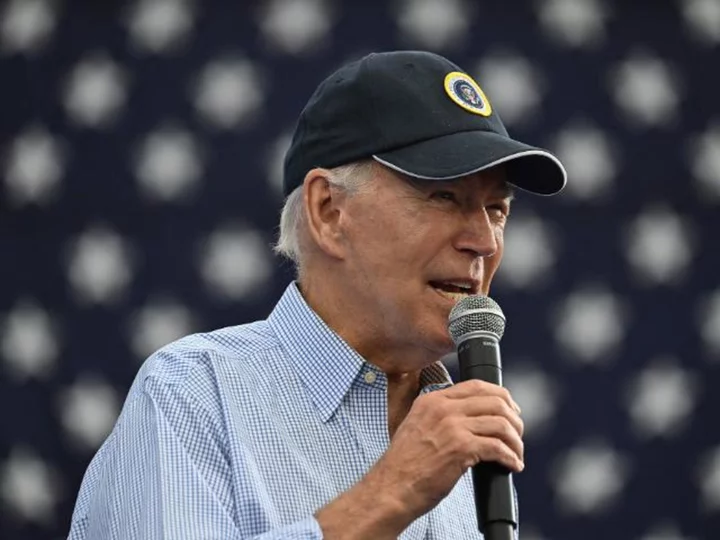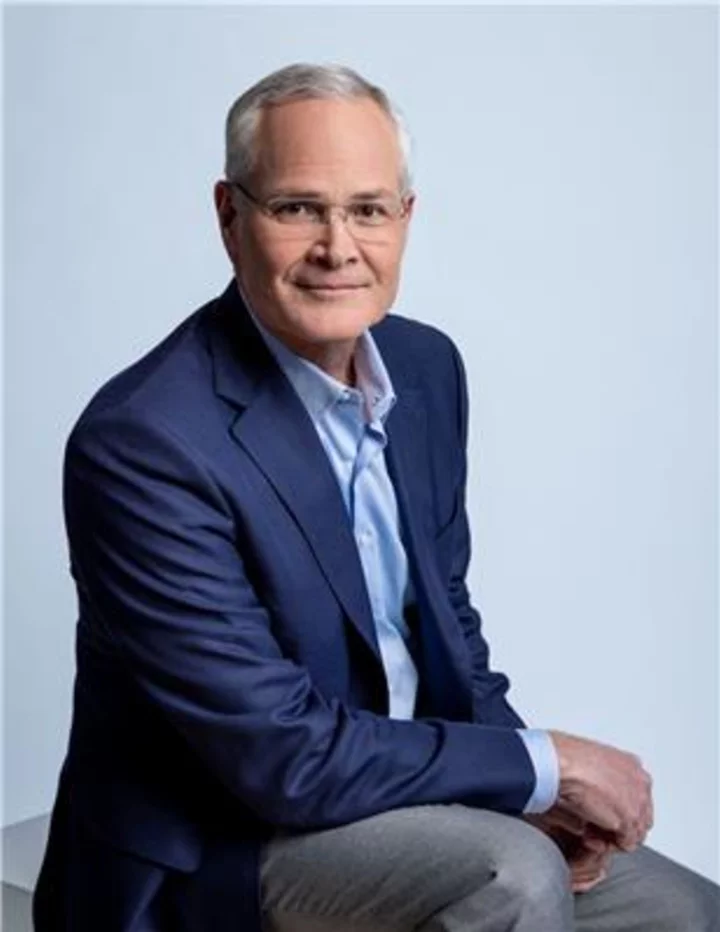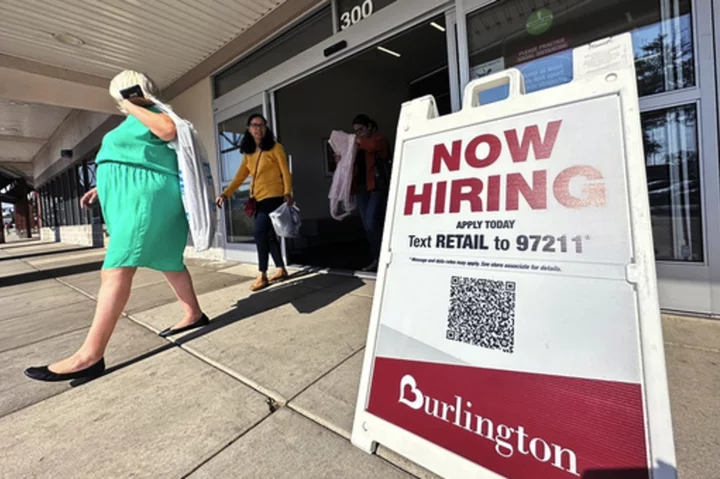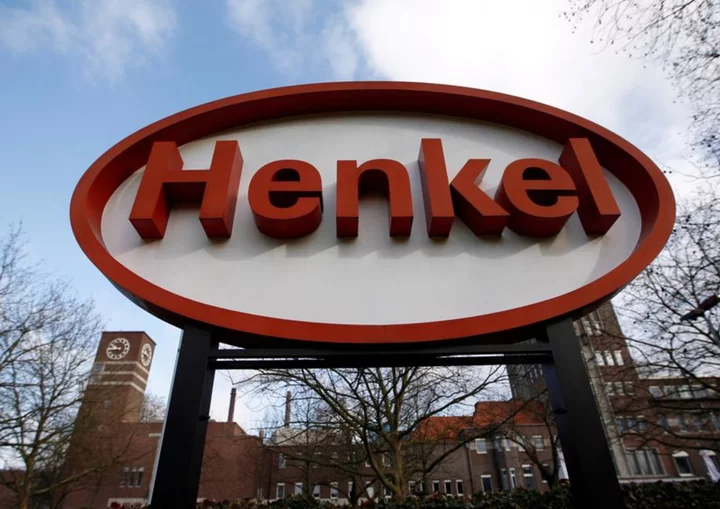President Joe Biden may hope the United Auto Workers union will not strike the nation's three unionized automakers. But right now about all he can do is hope.
Biden doesn't have the legal authority he would have if a freight railroad or airline was threatening to strike. In those cases, a different labor law gives the president the authority to order both sides to continue on the job. So the best he can do is apply public pressure.
But despite his reputation as a pro-union president, his influence with the union is fairly limited, especially considering its criticism of the administration's support of a move away from gas-powered cars to EVs, which the union sees as bad for the jobs of many of its members.
And his ability to pressure the automakers is also limited, given what they see as the need to compete with nonunion automakers such as Tesla and foreign auto brands.
There are 145,000 UAW members spread across General Motors, Ford and Stellantis, the company that makes vehicles for the US market under the Jeep, Ram, Dodge and Chrysler names. The union rank-and-file overwhelmingly approved strikes starting September 15 against any of the companies that doesn't have a tentative labor deal in place by then.
The administration has so far avoided three potential strikes that could have devastated the nation's economy — at UPS, the ports up and down the West Coast and the nation's four major freight railroads.
A 10-day strike against all three automakers would cost the US economy more than $5 billion, according to analysis by Anderson Economic Consulting, a Michigan research firm. Not only would the automakers and union members take an economic hit, but so would suppliers and many other businesses nationwide. The six-week strike at GM alone in 2019 was enough to put Michigan into a recession, even if that didn't cause a wider nationwide economic downturn.
A strike against all three automakers would be the first time in UAW history that the union will have waged a simultaneous strike against the "Big Three." It would be the nation's largest strike in 25 years. And UAW President Shawn Fain vows the union is ready to strike all three if there aren't agreements by the 11:59 pm ET contract expiration on September 14.
Uneasy relations between UAW and Biden
Fain has been critical of Biden at some times, pleased with him at others.
The union is not pleased with administration's support of industry efforts to convert from traditional internal-combustion-engine powered vehicles, to electric vehicles, which have far fewer moving parts and require roughly 30% less hours of labor to build.
The automakers are getting government loans to build more than 20 EV battery plants nationwide, many in Southern states, to power those vehicles. Those plants are expected to pay a fraction of the wages paid to UAW members at the vehicle assembly, engine and transmissions plants under the current contract, let alone the significantly higher wages they're demanding in these negotiations.
"These companies are extremely profitable and will continue to make money hand over fist whether they're selling combustion engines or EVs. Yet the workers get a smaller and smaller piece of the pie," said Fain in June when Ford and South Korean battery manufacturing partner SK got a $9.2 billion federal loan to build three battery plants. "Why is Joe Biden's administration facilitating this corporate greed with taxpayer money?"
But after Biden and Fain met at the White House in July, Fain has played down his criticism of the president, who has come out and echoed some of the UAW talking points in the negotiations, saying that he supported "a fair transition to a clean energy future."
Biden said automakers should agree that the automakers should "honor the right to organize," since the new battery plants will not automatically have its employees represented by the UAW. He also said that when engine or transmission plants close due to the transition from ICE to EVs, the automakers should "retool, reboot and rehire in the same factories and communities at comparable wages, while giving existing workers the first shot to fill those jobs."
Fain, who has repeatedly referred to the need for a "just transition to EVs," praised Biden's comments at that time.
"We appreciate President Biden's support for strong contracts that ensure good paying union jobs now and pave the way for a just transition to an EV future," he said.
But even if there are signs of a truce between Biden and Fain, there's a lot antipathy about Biden by rank-and-file union members who are very skeptical about the need for EVs, and the effect they will have on their jobs. Feeding into those doubts are attack on EVs and Biden's support for them by Donald Trump.
"Joe Biden's electric vehicle mandate will murder the US auto industry and kill countless union autoworker jobs forever, especially in Michigan and the Midwest," said a statement from the Trump campaign Thursday. "There is no such thing as a 'fair transition' to the destruction of these workers' livelihoods and the obliteration of this cherished American industry."
No UAW endorsement of Biden - yet
Monday, when Biden told reporters on the way to a Labor Day event that he didn't expect an auto strike, Fain, while expressing "shock" at the comment, didn't criticize it directly, instead saying it was up to the companies, not the president, on whether there would be deals or strikes.
"I appreciate President Biden's optimism. I also hope that the Big Three get serious and start bargaining in good faith. We are ready to do what is necessary to get our share of economic and social justice for our members," Fain told CNN Monday afternoon. "We have a long way to go and a short time to get there."
While the AFL-CIO has already endorsed Biden's reelection campaign, calling him the most pro-union president of our lifetime, the UAW has thus far declined to endorse him. Fain told CNN that the endorsement would have to be earned.
He did send a warning shot to the White House Wednesday when he said Biden and other Democrats would have to show which side they're on if there is a strike.
"I think our strike can reaffirm to [Biden] of where the working-class people in this country stand and, you know, it's time for politicians in this country to pick a side," he said in a CNBC interview. "Either you stand for a billionaire class where everybody else gets left behind, or you stand for the working class, the working-class people vote."
Biden has named close adviser Gene Sperling, a Michigan native, as the administration's point person to monitor the talks. But so far neither side has requested federal mediation in negotiations. And Fain has made clear the union intends to strike on September 15 against any company that doesn't reach a tentative deal, so it's unlikely the union would appreciate any government intervention at this late date.
Different role preventing other strikes
The Biden administration played very different roles in the earlier negotiations at UPS, the ports and the railroads.
At UPS, it followed the Teamsters union's desire that it stay out of negotiations, and a tentative deal was reached a week before a strike deadline which was later overwhelmingly approved by union membership.
At the ports, acting Labor Secretary Julie Su helped mediate the talks after being invited in by both sides. There, the two sides had both continued to work for months under terms of an expired contract without there being a strike.
At the freight railroads, which operate under a separate labor law from most other private sector workers, Biden and Congress imposed a contract on workers to keep them on the job despite the fact that most had voted against it. The president was criticized by unions for that action.
Biden and Democrats in Congress supported a second bill that would have met a key union demand — sick days for members — but despite majority support in both chambers, it failed to get the 60 votes it needed to pass the Senate. However, since then, most of the railroads have reached agreements with most of the unions to grant the workers the sick day provisions they wanted.









